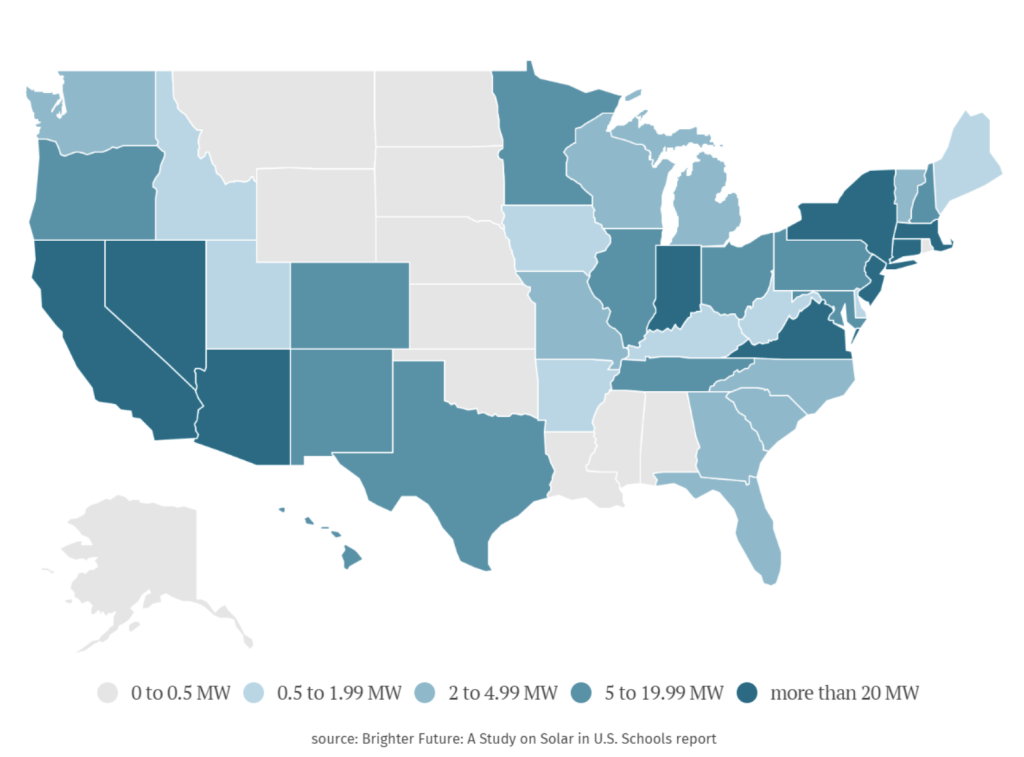May 05, 2021
Webinar: How North Carolina K-12 Schools Can Go Solar with No Upfront Cost
Thursday, May 20, 2021 at 1:30 Eastern
North Carolina ranks third in the nation for installed solar capacity, and generates 7.5% of their energy usage from solar energy. Yet few North Carolina schools have solar panels installed on campus, and when it comes to solar schools, the Tar Heel State lags behind its neighbors with only 57 schools having gone solar as of 2019.
Of neighboring states, Virginia in particular ranks #8 for solar schools, and has grown solar on schools from zero a decade ago to more than 89 schools with solar as of recently. What’s their secret?
What made the difference was changes to state regulations that allowed financing for solar with no upfront cost. Over the last few years, Virginia made Power Purchase Agreements (PPAs) legal in more and more parts of the state. In other areas, service agreements were allowed that offered customers many of the advantages of a PPA, especially solar with no upfront capital investment.
Such agreements also make solar cheaper for non-taxable schools than buying their own solar panels. Under a PPA or service agreement, a solar developer can qualify to use federal tax credits and can then pass the savings along to a non-taxable customer like a school system.

As part of our company’s expansion into North Carolina, Secure Futures will be hosting a webinar for school superintendents, principals, sustainability managers and facility managers on Thursday, May 20th at 1:30 PM.
Our North Carolina representative Jeff Gowdy will host this panel with two of our most experienced solar customers at schools in Virginia to talk about their experience with solar under a service agreement:
- Dr. Eric Bond, superintendent of Augusta County Public Schools, will discuss benefits for education, especially through our hands-on STEM curriculum taught jointly with the Science Museum of Virginia, Throwing Solar Shade®. He’ll also talk about how solar is set to save his schools $495,000 over 20 years.
- Facilities Specialist Doug Arnold at Orange County Public Schools will talk about money savings, how to convince your school board to approve your project and how roof restoration was rolled into their solar agreement.
Why now? PPAs are still not allowed in North Carolina. Yet, recent changes in utility regulations in North Carolina to allow solar equipment leasing have also legalized service agreements that allow schools to get solar with no upfront cost.
Then, along with no money down, schools can save money on energy along the way, starting from Day One. That’s because Secure Futures always structures its projects to offer customers electricity at effective rates lower than what the local utility would charge.
On top of that, with solar rebates for non-profit and non-taxable customers from Duke Energy, there are millions of dollars available for both public and independent schools in North Carolina to go solar at no upfront cost.
Saving money on energy has become more important to schools as pandemic-related financial stresses take their toll on budgets. Accommodating distance learning and hybrid classes has added costs at the same time that local tax revenues may be down, putting school boards under pressure to do more with less.
The head of the National Association of Secondary School Principals explained it in Education Week:
Budgets are shrinking while needs are expanding from the pandemic […] Schools need funding not just to stabilize budgets shaken by local economies, but to accelerate learning after the pandemic. Unless Congress gets serious for the long term about supporting their own public schools, we’ll be cutting into bone—fewer teachers, larger classes, and less social support for kids at precisely their time of greatest need.
The kind of money that our K-12 customers are saving in Virginia, and that solar schools are saving in other states, can make a difference.
For example, with the money it saved by going solar, this school in Arkansas raised its teachers’ salaries. Solar schools expert Tish Tablan at Generation 180, a non-profit champions solar for schools, feels that service agreements with solar at no upfront cost have been the missing piece to solve the puzzle of solar schools:
More than three-quarters of that solar on schools is not coming out of school budgets — it’s getting paid for by a developer who owns, installs and maintains the solar energy system. So they’re seeing no upfront costs and immediate cost savings.
To learn more about how this model proven in Virginia and other states can help your school system go solar under North Carolina’s rules, join our webinar.
Webinar for North Carolina K-12 Schools
on Going Solar at No Upfront Cost
Thursday, May 20, 2021 at 1:30 Eastern
Open to school superintendents, principals, faculty, staff, students and parents
Free with advance registration